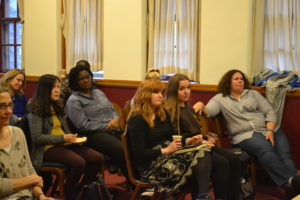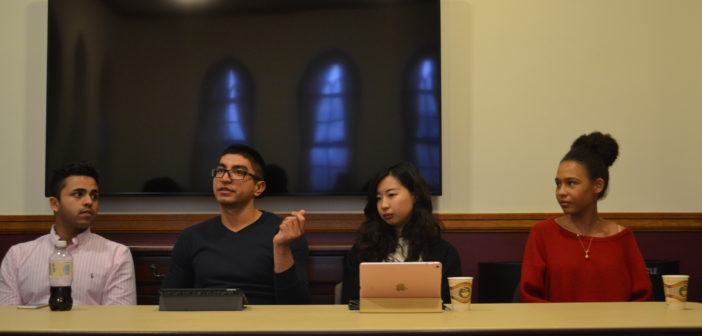Sophia Kuipa, ’20, an international student from Zimbabwe, was deducted two points on two separate assignments before she realized her microscopic mistake.
Kuipa, accustomed to the practices of the British schooling system, used commas where Americans use decimal points.
She said while this issue seems insignificant and she can laugh about it now, there are many adjustments international students must make at Lehigh.
Kuipa and three other student panelists, Naijia “Coco” Chen, ’20, from China, Abdul Moiz Gul, ’20, from Pakistan, and Begench Orazgeldiyev, ’17, a graduate student from Turkmenistan, shared their stories about adjusting to Lehigh at a conversation called Student Voices: International Students’ Experiences on Feb. 22.
Samba Dieng, the director of the Office of International Students and Scholars, selected the students for the panel.
“I wanted to pick a diverse group of students — males and females from different countries and in different colleges,” Dieng said.
Dieng organized the event with Greg Reihman, the director of the Center for Innovation in Teaching and Learning, and Bruce Whitehouse, an associate professor of anthropology and co-director of global studies. Whitehouse facilitated the discussion.
Dieng said the goal of the event was to start a conversation between students and faculty about helping international students adjust to American culture and life at Lehigh. The students discussed the differences between Lehigh and schools they had attended in their home countries.
The panelists agreed they had difficulty using MLA formatting and contributing to class discussions. Many said they worried they would sound stupid if they participated or asked questions in class because of the language barrier.
Chen said she initially struggled to keep up in discussion-based classes because often the topic of the conversation would change by the time she had figured out how to articulate her ideas in English.
The panel agreed they sometimes feel ostracized by other students.
“Finding a group (for classwork) is the most terrifying experience,” Orazgeldiyev said.
The panelists said they prefer when professors assign groups for group projects. Chen said this way, she has a chance to get to know students and make a connection with them because they are required to interact.
“International students experience this social exclusion,” Whitehouse said. “I hadn’t heard anything about that before.”

The audience listens during Student Voices: International Students’ Experiences on Feb. 22 in the UC. A panel of four international students shared their experiences and stories. (Alexis McGowan/ B&W Staff)
Whitehouse said the panelists had been successful at overcoming and adapting to this challenge.
Aside from social exclusion, some of the students said they felt they were at a disadvantage for some opportunities.
Moiz Gul said various companies at the career fair were impressed with his resume but lost interest when he mentioned he is from Pakistan. He said he thinks this may have been because of the legal issues and challenges associated with obtaining a worker visa in addition to his student visa.
Dieng said he organized the event to give students their own voices and allow them to share their experiences directly with faculty, as opposed to having the Office of International Students and Scholars act as a liaison between the two groups.
With about 30 students, faculty and staff in attendance, Dieng said he was thrilled with the turnout at the event.
“I thought it was phenomenal,” Samba said. “I thought all members of the panel were absolutely amazing…I am very proud of these students.”






Comment policy
Comments posted to The Brown and White website are reviewed by a moderator before being approved. Incendiary speech or harassing language, including comments targeted at individuals, may be deemed unacceptable and not published. Spam and other soliciting will also be declined.
The Brown and White also reserves the right to not publish entirely anonymous comments.
5 Comments
I’m surprised Bruce hadn’t heard anything about the social barriers intl students face here — it’s a huge problem across the country, and it doesn’t change unless the admin very actively and intentionally fosters friendships — meaning primarily putting the onus on USian students to be good hosts, good diplomats. They must extend the hand, they must learn to pronounce the names, listen well through accents, learn about the other places and cultures. Not just in special sessions, but in class, in the dorms. If they don’t know how to do that, that’s fine; teach them. But make it clear that good international citizenship is expected of all Lehigh students.
Social exclusion is a killer because being an international student away from home is difficult, compounded by our complex culture and language problems. Welcoming and assimilation assistance must come from numerous sources to aid these young people embarking on life’s journey. Most struggle in their efforts and need guidance from schools’ international departments, immigration protection, host families, concerned neighbors and fellow students, and even informative books to extend a cultural helping hand so we all have a win-win situation.
Something that might help anyone coming to the US is the award-winning worldwide book/ebook “What Foreigners Need To Know About America From A To Z: How to Understand Crazy American Culture, People, Government, Business, Language and More.” Used in foreign Fulbright student programs and endorsed worldwide by ambassadors, educators, and editors, it identifies how “foreigners” have become successful in the US, including students.
It explains how to cope with a confusing new culture and friendship process, and daunting classroom differences. It explains how US businesses operate and how to get a job (which differs from most countries), a must for those who want to work with/for an American firm here or overseas.
It also identifies the most common English grammar and speech problems foreigners have and tips for easily overcoming them, the number one stumbling block they say they have to succeeding here.
Good luck to all at Lehigh or wherever you study or wherever you come from, because that is the TRUE spirit of the American PEOPLE, not a few in government who shout the loudest!
I’m appalled that an anthropologist doesn’t know that international students tend to be ostracized!
I was an international student at Lehigh and was bullied & ostracized during all four years. I assumed there was something wrong with me, but living in NYC and later at Yale, I had only positive interactions. It became clear that the real problem was the lack of intellectual curiosity and closed-mindedness pervasive in the Lehigh student body.
Not a good reflection on Lehigh. Did the Office of International Students and Scholars exist at the time, if so were they responsive? For being “bullied & ostracized” I can understand “closed-mindedness” as a cause; I can think of other reasons for people acting like jerks but “lack of intellectual curiosity” doesn’t seem to fit. In my day sometimes engineering students were too busy too be intellectually curious or to be socially active but never bullying or ostracizing minded.
It is not a good reflection on Lehigh, but there is much truth in this. Even as a native of Pennsylvania, the closed-mindedness at Lehigh and attitude of many students, as well as discrimination, is disconcerting and should be a thing of the past.